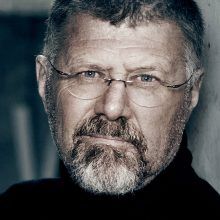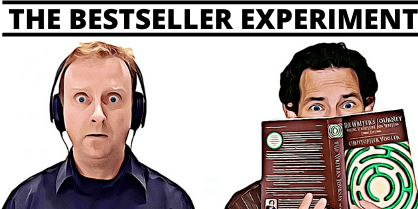EP41: Deon Meyer Fever!

PODCAST
In this episode you will discover…
- Why struggle is a positive not a negative
- Why genre shouldn’t matter when you’re writing
- Why finishing your first draft is so important
- And why your brother telling you you’re rubbish should not hold you back from success!
Thanks for listening and joining us. Have some feedback you’d like to share? Leave a note in the comment section below.
SPREAD THE LOVE
If you enjoyed this episode, please share it using the social media buttons you see at the bottom of the post.
SUBSCRIBE, RATE & REVIEW ON ITUNES
Please do subscribe on iTunes and leave an honest review for The Bestseller Experiment Podcast on iTunes. Ratings and reviews are extremely helpful and greatly appreciated! They do matter in the rankings of the show, and we read each and every one of them. Don’t forget, when subscribing to the show on iTunes you will get automatic updates.
If you have any questions, you can contact us here.
Episode Highlights:
- Bestseller Experiment: Facebook | Twitter (@bestsellerxp) | Instagram | Pinterest
- Scrivener – Software for Writing
Links featured in today’s show:
- Bestseller Experiment’s Vault of Gold. Sign up to get your free Writer’s ebook
- Question Mark: Have a question you want answered on the show? Click here.
EPISODE TRANSCRIPT (HIGHLIGHTS)
Deon is a bestselling thriller writer from South Africa whose books have been translated in 20 languages, but with his latest book Fever he has written a post-apocalyptic epic with a big heart.
You’ve talked about how writing is a journey that not only changes the story, but yourself. Where did that thought come from?
Let me start by saying I find the creative process inscrutable. I find it very hard to describe, all I can tell you is I enjoy it very much. My grandfather has this big pocket watch that tick-tocked very loudly and as a child I often asked him if we could open it up, and look at what’s happening inside, and he said, ‘The problem is that we might not be able to put it together again, so let’s just have it work.’ And I feel the same about the writing process, in that I don’t really know how it works and I don’t want to fiddle too much with the springs and the gears. But here’s more or less how it works for me; with Fever, specifically, I had a beginning, I had few first chapters that I had to put aside for almost three years, because my agent said the market wasn’t quite ready. I still had to establish myself in certain new markets, so I had to write two crime novels before that. And I had an ending in mind, and I had nothing in between, so when I got back to the novel after three years, I still didn’t have anything in between.
It is, on the one hand, very intimidating, but intimidation creates a certain energy and a certain fear that generates a lot of creativity.
I sat down and rewrote. And the next chapter happened, and then the next chapter happened… That is what I mean when I say it is a journey into the unknown. You have to go and discover the story. I’m quoting another author when I say, it’s like driving a car at night: you know more or less what your destination is, at least you know what direction you’re heading, but all you can see is what is illuminated by the headlights, which is often the next few chapters. Whatever comes after that, you know it’s out there, but you gotta go find ti, you gotta go right towards it.
What was the appeal of the post-apocalyptic novel to you?
I loved the story idea. I never think in terms of genre. Half of my work has been typical crime fiction, the other half has been probably more suspense novel material. I’ve never thought in terms of limiting myself to a specific genre. My approach is that I want to write the story that I feel most passionate about next, and Fever was something that I felt very passionate about for a long time. The story idea came together from little bits and pieces over the years and stuck in the back of my head, so I didn’t really think too much about the fact that it was speculative fiction, or post-apocalyptic fiction. I see all my work as a story, and I see my job is to tell stories as entertainingly as possible and let someone else worry about the genre.
Had you read any of that genre previously?
Yes, I had. In my teens and twenties, and probably my thirties too, I read all the great classics: Earth Abides, everything I could lay my hands on. I love the genre. Somehow, in my forties and up to now in my late fifties, I haven’t read something in that genre for quite a while, but the story came together and the feeling is it had the potential to be a really good story, and that’s why I went for it.
You started writing when you were fourteen and your brothers read your first piece of work and told you it was rubbish… then you got back into it in your thirties, is that right?
Yes, towards my mid-thirties. I believe that there are two types of people in the world; those who have such a strong urge to write that they can’t not do it, and those who have the urge, but it’s not quite strong enough to write.
I always had that need, that urge. I think one is born with it.
When I was fourteen I wrote a sort-of long short story, and the reaction of my brothers was not conducive to further writing (laughs). I tried again in my twenties. I was working at a university in South Africa, and I tried to write a novel again, and I realised it was very bad. Pondering it, trying to figure out why it wasn’t working, I knew that the characters were very one-dimensional, not interesting at all. My conclusion was that I simply hadn’t lived enough to really come to grips with who I am and what humanity, what people, are like. I thought maybe I’ll never get there, but let me not frustrate myself any further. And then in my thirties I started writing short stories. Again the urge was just too big. It was a pragmatic approach: let me try and write short stories and learn the craft of writing that way. I sold it to a magazine. Wrote another one, and they didn’t want it. I just kept going, and for three of four years I just wrote short stories, and I learned so much from it that I finally had enough courage to do the marathon of a novel.
Did you have any aspirations to get to where you’ve got to today?
When I started writing it was just after the end of Apartheid. Under Apartheid, no South African novelist writing in Afrikaans had any chance of being published anywhere else, so when my first novel was published two years after the end of Apartheid, I was just extremely happy to find an Afrikaans publisher for it. The funny thing was, back in those days my manuscript was the first suspense novel in something like twenty-five-odd years to reach this publisher, so there really were no editors who understood what to do with it. It was published in a very common and lowbrow fashion with a gaudy cover of a woman with a low cut dress. They didn’t know what to do with it, and the book didn’t sell very well initially. It was new for everybody. But I had no idea that I could have a career in writing. I think, like many authors, the other fear is always perhaps I’m only a one-trick pony? A one-novel man. Maybe there isn’t another novel inside of me? So, I absolutely had no hope. It’s been an incredible journey of surprise and magical things happening.
You’ve worked in film and TV. When you write now do you think of scenes in terms of a movie?
Not at all. I find writing a novel hard enough just to make it work as a novel. I don’t think in any other terms. I do think very visually when I write, I can see the scene that I’m writing, I can see very clearly in my head. The magic of novels and short stories is that we all make our own pictures when we read something, or write something. I absolutely don’t even think about any other medium.
Fever has multiple story threads. How do you keep track of them?
I use an app called Scrivener (cue much cheering from the hosts). It’s the most brilliant writing app out there. I use the column on the right hand side for notes all the time if I do need to keep track of something. I’m so into it when I write that I keep track of everything in my head. The notes are mostly, ‘Remember that this might happen to this character in the future.’
Are you a write every day author?
Yes, I do, but let me add only when I’m at home. When I’m doing book tours, that’s impossible. Although, I did a US tour at the very end of a novel and I wanted to finish it, so I did do some writing in hotel rooms in San Francisco, and in Houston, but that was an absolute odd occasion. When I’m home I do write every day.
There’s a wonderful African expression, ‘How do you eat an elephant? Bite, bite, bite.’ And that’s the same way you write a novel: you’ve got to sit down and bite at it every day.
Do you have a structure to your day?
I have a very firm structure. When I started writing I had two small kids, I was a single parent. The only time that I could write — when they were in bed, asleep — was very early in the morning. I used to write from four till about six-thirty in the morning. I fell in love with that time of day, so I still get up about five o’clock every morning. And then I re-write what I did before. I will read through it, and I will re-write it and it usually takes me till breakfast. And then I’ll get stuck in and write further.
Scrivener has a wonderful little thing where you can set yourself a target and you know when you want to finish and it tells you how many words you have to do every day. I try to stick with that, but you’ve got to accept that there will be good days and bad days. When it’s a bad day, I just chip away and even if I just write forty or fifty words that’s okay, because I know tomorrow, or the day after, I’ll catch-up again.
The most important thing is to sit there and struggle.
I think it’s really important to struggle. Writing is all about making creative choices and solving creative problems. And sometimes you can’t solve that problem on the day while you’re sitting there, but the more you struggle with it, the more it goes into the subconscious and when you go and have a shower or if you go to bed, the next morning you often wake up with a solution. I’m a great believer in just chipping away even if it’s a bad day, then really enjoy the good days.
You’ve written and directed in TV and film. Did you take away any big lessons from that?
Novel writing and screenwriting influence one another. Everything that you do influences your writing, everything you see, everything you read, everything you hear. Screenplays are a lot about structure, and I think crime fiction especially is also a lot about structure, and I’ve always been fascinated by structure. Writing a TV series is a completely different structure. The wonderful thing about TV series is that every episode has got its own little dramatic structure, but you’ve also got the arc of the whole season. In terms of structure I’ve learned a lot from screenwriting.
Is there one piece of advice that’s stuck with you?
One of the big life lessons, and writing lessons I’ve learned over the past year or two, especially around Fever, is that you’ve got to accept that you can’t please everybody. You can’t make everybody happy with a book, and you shouldn’t try. I write for only one reader: and that’s the reader within me. And I honestly believe that’s the only reader we all know. We can’t try and write for a British reader, because they are so varied.
Write for the only reader you know, and that’s the one inside of you.
And read your work from that point of view. Try to please yourself, and you hope there are other people who like your taste, too.
Was Fever’s African setting important to you?
All my novels are set in Africa for two reasons: one is that I am in love with the South African landscape, I think it is probably the most beautiful country in the world, and it’s also a very dramatic landscape. South Africa is a country that inspires storytelling. We have such a rich tradition. So the two go hand-in-hand for me. I couldn’t think of writing a story set anywhere else.
And what advice would you give to your fourteen-year-old self?
You can’t please everybody. Try and have as much fun in writing. Writing as a fourteen-year-old was so much fun, and I still try to do that, I still try to have fun. Sometimes it’s hard to have fun when you’re sitting there and battling. it’s got to be a joy, it’s got to be a passion, it’s got to be something that’s fun.
SHARE THE MEMES…
VIDEO TRAILER
SHARE THE PODCAST WITH A FRIEND
SUBSCRIBE TO THE BESTSELLER EXPERIMENT PODCAST!


